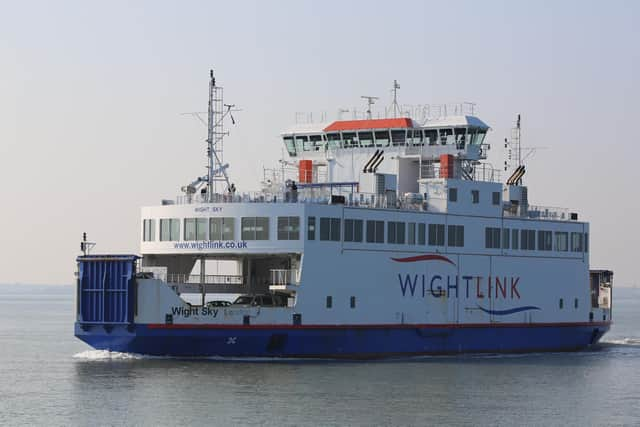Investigation into 'catastrophic' Wightlink ferry engine failures concludes 'insufficient technical oversight' caused problems including fire en route to Lymington
and live on Freeview channel 276
Vessel Wight Sky suffered two malfunctions in less than a year, one of which resulted in a fire.
Her main engine malfunctioned as she prepared to enter the Lymington River, on its regular crossing from Yarmouth, Isle of Wight, on August 26, 2018.


Advertisement
Hide AdAdvertisement
Hide AdThe engine was a replacement for the previous broken appliance, which resulted in a fire and serious injuries to an engineer officer.
On December 14, 2018, Wight Sky’s engine failed for a third time, which had been newly built and only operational for 389 hours.
A report was commissioned to find the cause of the break-downs.
At the time, Wightlink withdrew its Wight Class ferries from service.


They were returned to service following a mitigation plan.
Advertisement
Hide AdAdvertisement
Hide AdThe ferry owner, the Maritime and Coastguard Agency, Lloyd’s Register, and the engine manufacturer, Volvo Penta, were all part of the discussions.
After the investigation, a history of engine failures across the Wight Class fleet dating back to 2010 was found.
Consequently, it was expanded to examine all known failures.
Five failed engines, and their components, were forensically examined and tested.
Advertisement
Hide AdAdvertisement
Hide AdA full review of the vessels’ system design and operation, planned maintenance, monitoring procedures, and manning and technical oversight, took place.
The Marine Accident Investigation Branch (MAIB) published an interim report of initial findings in 2019.
Among them, ‘insufficient technical oversight’ of the engines’ operating parameters, was cited as a key safety concern.
Andrew Moll, chief inspector of marine accidents, said: ‘This has been a long and complex investigation.
Advertisement
Hide AdAdvertisement
Hide Ad‘Initially focusing on two catastrophic engine failures, the investigation found a history of engine failures across Wightlink’s fleet of Wight Class ferries dating back to 2010.
‘Consequently, the scope of the investigation was broadened to include the forensic examination and testing of five failed engines and their components, a full review of the vessels’ propulsion system design and operation.
‘MAIB has worked closely with companies involved to ensure over the past three years to help ensure that most of the technical issues identified in the investigation report were addressed as soon as practicable.’
Safety recommendations include ensuring competent technical oversight of maintenance, providing customers with manufacturer safety bulletins, and measures to declutch an engine from its drive shaft during emergency shutdowns.
